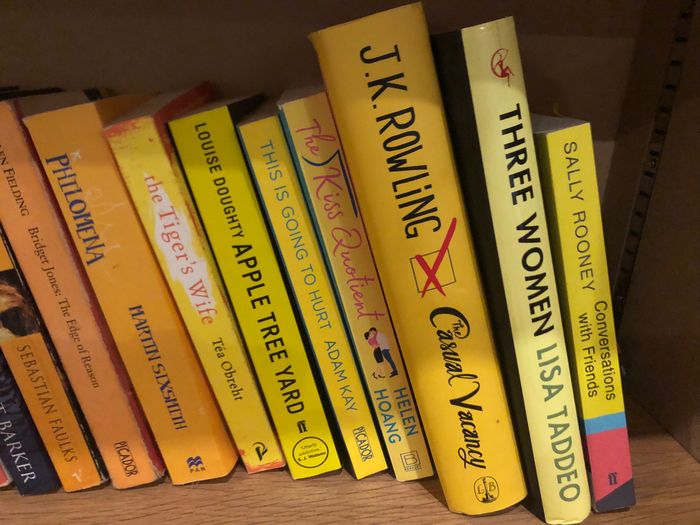My beef with BookTok: ‘uninventive, repetitive, and reductive’
It’s very difficult to have a fruitful discussion about literature on an app where the average time of a video is seven seconds long

“Sad girl books for sad girl summer”. This title, played over a sped-up audio of Grimes popped up on my TikTok for you page as I lay in bed, avoiding doing any dissertation reading. Pausing it before the reveal, I tried to guess what books would appear on the list. Normal People? Oh, certainly. And probably Conversations With Friends as well. Where the Crawdads Sing? I mean, Taylor Swift does have a song on the film soundtrack. Something by Colleen Hoover, for definite. And for good measure, throw in Otessa Moshfegh’s My Year of Rest and Relaxation, a book that (ironically) satirises the “sad girl” aesthetic (but who cares about nuance?).
Not to spoil the story, but I got a full house. It’s not that I’m a particularly intuitive person. The only reason I guessed so accurately was not because I possess secret psychic powers, but because of the prime problem with TikTok itself: it is completely uninventive, repetitive, and reductive.
A lot of the criticism levelled at BookTok is steeped in pretentiousness and elitism
It’s hard to criticise BookTok (the bookish corner of the app) without sounding like a fusty old academic who blames all the ills of society on technology. In fact, I believe a lot of the criticism levelled at BookTok is steeped in pretentiousness and elitism. “BookTok recommends rubbish!” So what? This “rubbish” is helping to encourage reluctant readers to open a book and undoing years of damage done by the education system. Are BookTok books often poorly written? Yes. Unoriginal? Absolutely. Contrived? Certainly. But boring? Definitely not. No one is calling Colleen Hoover the next literary genius, nor does she have to be. She has, however, reintroduced many people back to the radical notion that reading can be fun.
That aside, any positives that BookTok brings to the world of literary consumption are overshadowed by the negatives. First up, is its sheer repetitiveness. Partially due to the TikTok algorithm that regurgitates the same content again and again, BookTok is an echo chamber of the same handful of authors. Instead of finding new talent and introducing different authors to a new demographic of readers, the same titles and writers bombard the For You Page (FYP) until they become stale. I’m sure that once upon a time, Sally Rooney was a very fresh face. But thanks to an app that parrots the same things until all initial charm is obliterated, if I hear her name one more time I will scream.
Writers with fantastically nuanced books are reduced to a “core” aesthetic
This leads us swiftly onto the second, more sinister, part of BookTok - its reductiveness. TikTok is an app concerned with narrow categorisation. You can see it in the myriad “-Tok” suffixes that make up the FYP, and the endless aesthetics that have spawned from its depths (you know the end is near when you see a video labelling a plain vest “dark coquette fairy grunge core”). The compulsion to categorise into clear-cut boxes unfortunately does not turn a blind eye to BookTok. Writers with fantastically nuanced books are reduced to a “core” aesthetic that simply cannot encapsulate the complexity of their work. For instance, note the unfortunate fate of Moshfegh’s My Year of Rest and Relaxation, which was reduced to representing the very same aesthetic that it condemns. A moment of prayer for the “core” lovers who are currently trying to figure out where to place the scatological mediaeval hellscape of Moshfegh’s latest novel, Lapvona. Something tells me “cottagecore” might not cut it.
In Moshfegh’s case, this reduction is annoying yet fairly harmless, but what about classics like Lolita - a fascinating yet complex novel which BookTok cannot wrap its head around? The opinion seems to be split between romanticising Nabokov’s work by hashtagging it with terms such as “nymphette” or slating it as a book that condones the same topic it condemns. All nuance is completely erased. Why are these issues so unique to BookTok and not on Bookstagram (it’s Instagram relation) or - if we go really retro - book blogs? In short, it’s very difficult to have a fruitful discussion about literature on an app where the average time of a video is seven seconds long. Unless, of course, TikTok knows something scholars don’t. And maybe it is possible– though the jury’s still out here.
So, as I sit, scrolling on TikTok, procrastinating my essay, I continue to watch the same “Sadgirl books for Sad Girl Summer/Autumn/Winter” with fervour. Not because I really enjoy the sounds of Grimes sped up. But because deep down, I want it to be better. I await the day that BookTok moves past the same three titles, and when all writers can be celebrated and discussed in a (God forbid!) nuanced manner. Of course, doing all this in seven seconds is a great feat, so for now I will just wait until BookTok discovers James Joyce and figures out a “core” aesthetic I can discuss for my Ulysses essay.
 News / Clare Hall spent over £500k opposing busway 24 December 2025
News / Clare Hall spent over £500k opposing busway 24 December 2025 Comment / The ‘class’ of Cambridge24 December 2025
Comment / The ‘class’ of Cambridge24 December 2025 News / Caius mourns its tree-mendous loss23 December 2025
News / Caius mourns its tree-mendous loss23 December 2025 News / Girton JCR publishes open letter expressing solidarity with Palestine25 December 2025
News / Girton JCR publishes open letter expressing solidarity with Palestine25 December 2025 Comment / Yes, I’m brown – but I have more important things to say22 December 2025
Comment / Yes, I’m brown – but I have more important things to say22 December 2025










